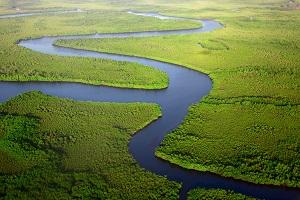
Transboundary waters are a global common good crucial for human life, which require concerted management and protection. The ninth session of the Meeting of the Parties (MOP 9) to the Convention on the Protection and Use of Transboundary Watercourses and International Lakes (Water Convention) has shown numerous examples of how countries around the globe govern transboundary waters in a cooperative, equitable and sustainable manner. The MOP 9 was organized by UNECE in cooperation with the Government of Estonia in a hybrid format with more than 500 participants from over 100 countries.
United Nations Secretary-General António Guterres emphasized in its address to the meeting, that “the Water Convention is a powerful tool to advance cooperation, prevent conflicts, and build resilience”, stressing that with the SDG 6 being “badly off track” greater commitment, courage, and solidarity to move such cooperation forward are needed.
MOP 9 welcomed Ghana, Guinea-Bissau and Togo as new Parties. Confirming the Convention’s growing recognition worldwide, several African and Latin American countries expressed interest in acceding to the Convention (including Burkina Faso, Côte d'Ivoire, The Gambia, Namibia, Nigeria, Tanzania, Uganda) or in exploring the benefits of accession (Guatemala and Zambia). Iraq committed to soon become the first member country in the Middle East.
The signature of a ministerial declaration between Senegal, Mauritania, The Gambia and Guinea Bissau on the shared Senegal-Mauritanian Aquifer Basin was a historical moment, as it laid the basis for a negotiation process to define, with support from the Water Convention and other relevant partners, the legal and institutional framework for the cooperative management of these shared groundwaters.
Indeed, transboundary water cooperation is crucial for peace and preventing conflict and often leads to benefits beyond water - concluded the more than 30 Ministers participating in the high-level segment. However, worldwide only 24 countries have all their shared waters covered by operational arrangements for water cooperation, as the second report on the SDG indicator 6.5.2 prepared by UNECE and UNESCO as co-custodian agencies has shown.
In this regard, the practical guide on the development of agreements and other arrangements for transboundary cooperation launched at MOP9 helps countries to develop such arrangements- and is already being used by several countries in their negotiations, as the meeting showed.
Globally, being a Party to the Water Convention makes a difference, as evidenced in the second report on the Water Convention. In the 45 Parties, more than 80% of the shared waters are covered by operational arrangements for water cooperation, whereas this figure is only 58% for other countries. However, the report also shows that climate change adaptation, financing and joint monitoring remain major challenges in the implementation of the Convention.
Sharing waters in an equitable and reasonable way under conditions of water scarcity and climate change can cause major tensions in transboundary basins. The Handbook on water allocation in a transboundary context provides tools, methods, a methodology and numerous good practice examples to address this challenge.
Financing transboundary cooperation has become even more complicated due to the Covid-19 pandemic. The publication on funding and financing of transboundary water cooperation and basin development, launched during the meeting and prepared in cooperation with several international financial institutions explains financial needs and financing sources, from the public and private sector as well as innovative emerging funding sources, such as blended finance and blue peace bonds.
Finally, the meeting clearly showed that broad partnerships and cross-sectoral cooperation are needed to achieve the SDGs. The publication on solutions and investments in the water-food-energy-ecosystems nexus in transboundary basins addresses bottlenecks, good practices to overcome silo approaches for the benefit of all.
Numerous partners expressed their support to the Water Convention as a unique global legal and intergovernmental platform for transboundary cooperation, ranging from financial institutions to international organizations such as UNICEF. These partners will be key in the implementation of the next Water Convention’s Programme of Work for 2022-2024 (adopted at the meeting).